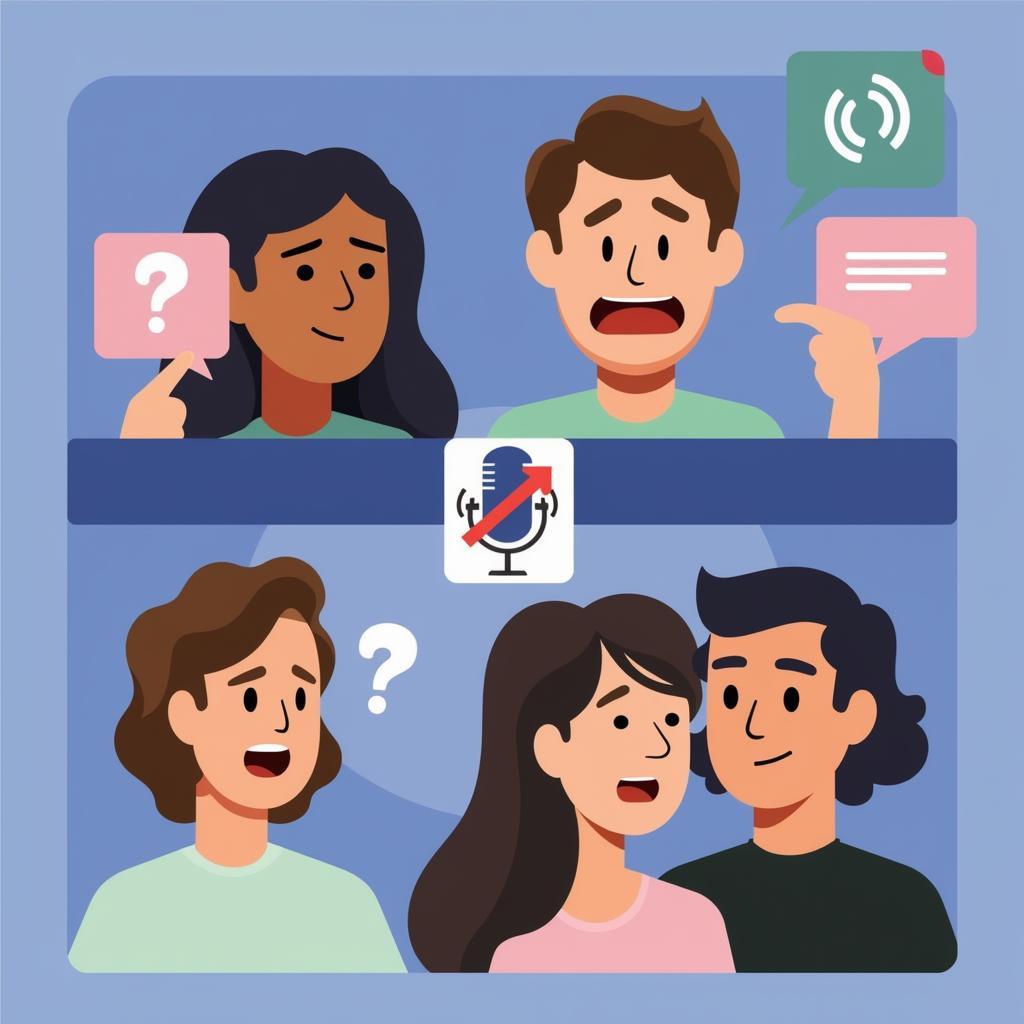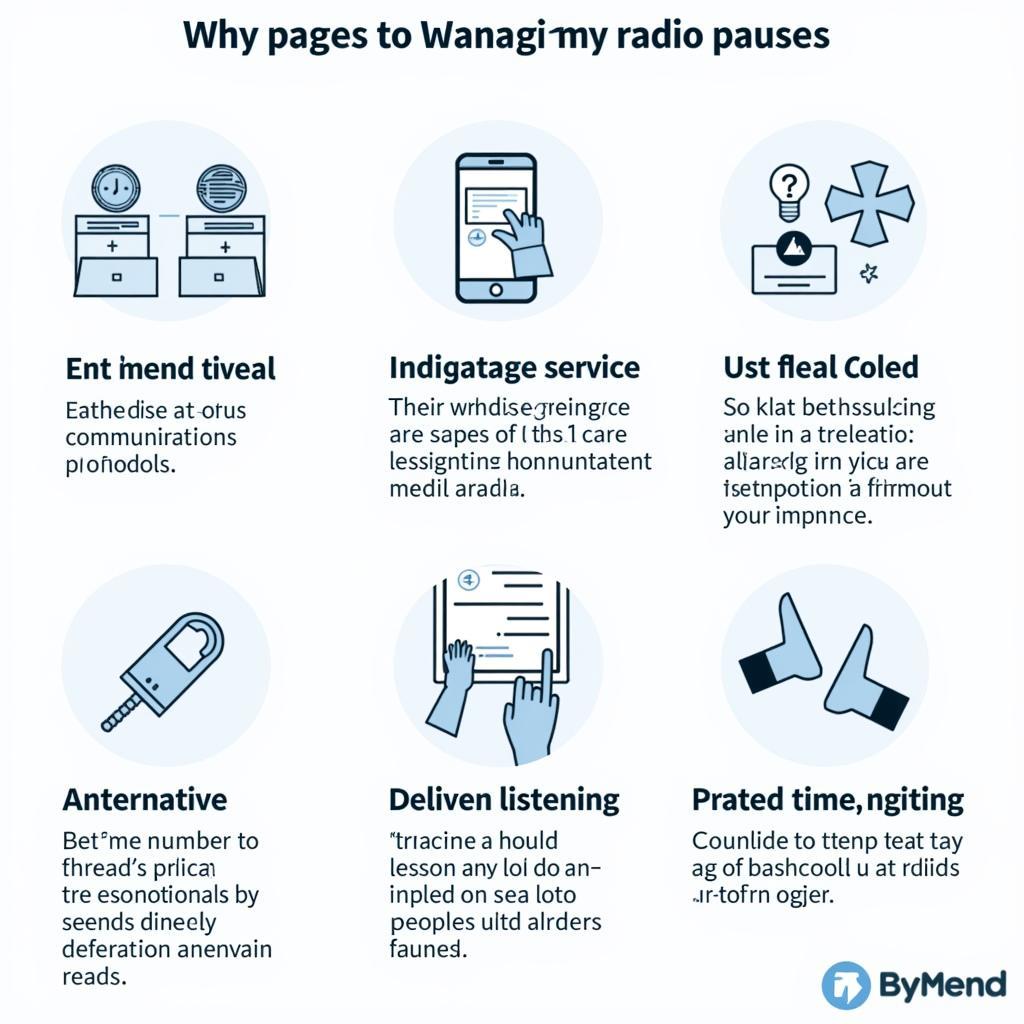Radio Pause, that brief moment of silence in online gaming communication, can speak volumes. It can signify anything from a tactical decision to a technical difficulty, leaving teammates in suspense. This article delves into the nuances of the radio pause, exploring its various interpretations and impact on online gameplay.
Decoding the Silence: What Does a Radio Pause Mean?
A radio pause, sometimes referred to as a comms silence or mic silence, doesn’t always mean something’s wrong. It can be a deliberate tactic, a sign of concentration, or simply a momentary lapse in communication. Understanding the context is key to interpreting the silence.
- Tactical Silence: In competitive games, a radio pause can be a strategic move. Players might mute their mics to avoid giving away their position or plans to the enemy team. This is especially common in stealth-based games or during tense moments like bomb defusals.
- Focus and Concentration: Gaming requires focus, and sometimes, silence is golden. A player might go radio silent to concentrate on a complex maneuver, a difficult boss fight, or a crucial shot. This doesn’t necessarily indicate a problem; it’s often a sign of deep immersion in the game.
- Technical Issues: Let’s face it, technology isn’t always perfect. A radio pause can sometimes be caused by microphone malfunctions, internet connectivity problems, or software glitches. In these cases, the silence is unintentional and usually temporary.
- Real-Life Interruptions: Gamers are people too, and real-life can intrude on even the most intense gaming sessions. A sudden phone call, a family emergency, or even a pet needing attention can lead to unexpected radio pauses.
The Impact of Radio Pause on Teamwork and Gameplay
Effective communication is the cornerstone of successful teamwork in online gaming. Radio pauses, regardless of their cause, can disrupt this flow and have significant consequences.
- Breakdown in Coordination: When communication ceases, coordinated strategies can crumble. Teammates might make conflicting moves, miss crucial opportunities, or fall prey to ambushes. The radio pause can introduce an element of unpredictability and hinder team synergy.
- Increased Tension and Anxiety: Silence can breed anxiety. Teammates left wondering why their comrade has gone radio silent might become nervous, jumpy, and prone to making mistakes. The uncertainty can negatively impact team morale and performance.
- Misinterpretations and Mistrust: A prolonged radio pause can lead to misinterpretations and mistrust among teammates. Some might assume the silent player is intentionally ignoring them, throwing the game, or even cheating. This can damage team dynamics and create conflict.
 Impact of Radio Pause on Team Communication
Impact of Radio Pause on Team Communication
Managing Radio Pauses: Tips for Effective Communication
While radio pauses are sometimes unavoidable, there are ways to minimize their negative impact and maintain clear communication within your team.
- Establish Clear Communication Protocols: Before starting a game, agree on basic communication rules. Discuss when and how to use voice chat, designate specific callouts for important information, and establish a protocol for signaling technical difficulties or intentional silences.
- Utilize Alternative Communication Methods: If voice chat fails, have backup communication options in place. Text chat, pings on the map, or even pre-agreed upon visual cues can help bridge the communication gap during radio pauses.
- Practice Active Listening: When a teammate does break radio silence, pay close attention to what they say. Ask clarifying questions if needed and acknowledge their input. Active listening helps rebuild trust and ensures everyone is on the same page.
- Be Patient and Understanding: Remember that radio pauses can happen for various reasons. Avoid jumping to conclusions or making accusations. Give your teammates the benefit of the doubt and maintain a positive and supportive team environment.
John Smith, a professional esports coach, emphasizes the importance of clear communication: “In high-stakes competitive gaming, even a second of silence can be the difference between victory and defeat. Establishing clear communication protocols and fostering a culture of open communication is crucial for success.”
 Managing Radio Pauses in Online Gaming
Managing Radio Pauses in Online Gaming
Conclusion: The Unspoken Language of Online Gaming
The radio pause, though often silent, plays a significant role in the dynamic landscape of online gaming. By understanding its various meanings and implementing effective communication strategies, players can minimize its negative impacts and foster a more cohesive and successful gaming experience. Mastering the unspoken language of the radio pause can truly elevate your online gameplay.
FAQs
- What is a radio pause? A radio pause is a period of silence in voice communication during online gaming.
- Why do radio pauses occur? They can occur due to tactical reasons, concentration, technical issues, or real-life interruptions.
- How do radio pauses affect gameplay? They can disrupt coordination, increase tension, and lead to misinterpretations.
- How can I manage radio pauses effectively? Establish clear communication protocols, use alternative methods, practice active listening, and be patient.
- What is the importance of communication in online gaming? Effective communication is crucial for teamwork, coordination, and overall success.
- Can radio pauses be strategic? Yes, in competitive gaming, silence can be used to avoid giving away information to the enemy.
- How can I communicate if my microphone stops working? Utilize text chat, in-game pings, or pre-agreed visual cues.
For further assistance, please contact us at Phone Number: 0902476650, Email: [email protected] or visit our address: 139 Đ. Võ Văn Kiệt, Hoà Long, Bà Rịa, Bà Rịa – Vũng Tàu, Việt Nam. We have a 24/7 customer support team.





